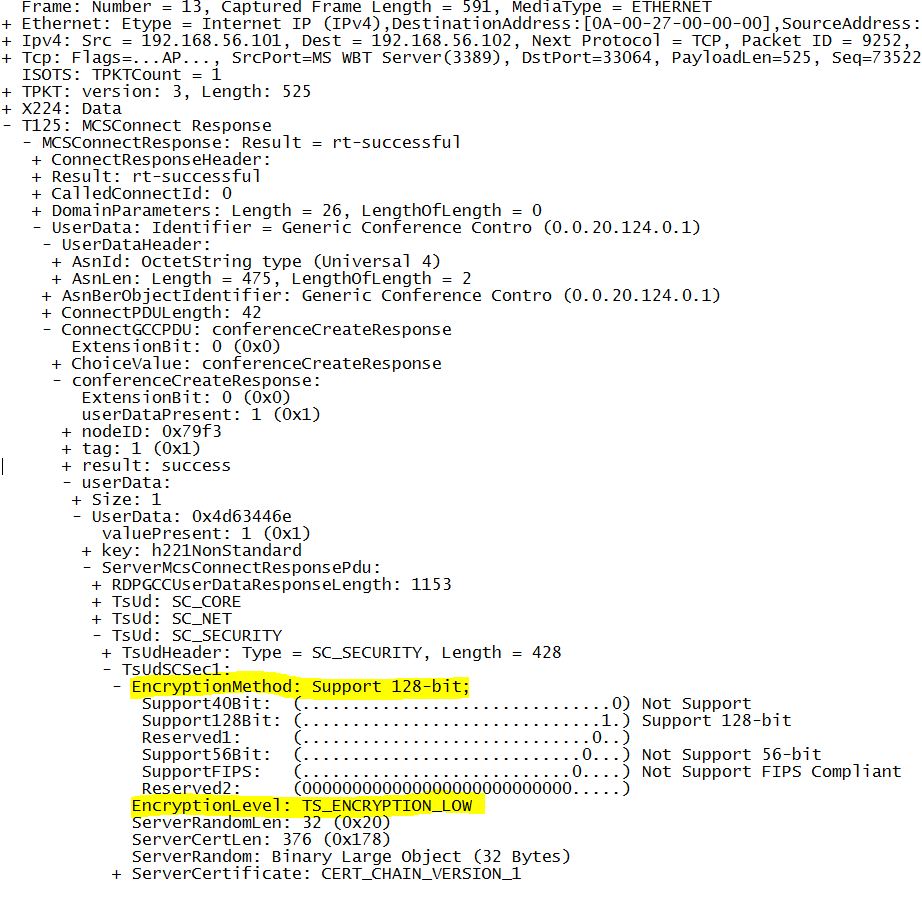Encryption Negotiation in RDP connection
Encryption Negotiation in RDP connection
The RDP connections between clients and servers are normally encrypted for better security. When we observe the network traffic to troubleshoot the RDP related problems, we may notice that the traffic between a server and client could be encrypted one way (such as client to server) and unencrypted the other way (such as server to client). We may also find that it doesn’t seem possible to turn off the encryption for the PDUs sent from the client to server. These questions can be answered by taking a look at the encryption negotiation process in MCS (MultiplePoint Communication Service) connect request and response.
Encryption Settings in RDP protocol
There are two encryption settings in this process: Encryption Level and Encryption Method. The Encryption Level is configured on the server and sent to client and has four levels as below (5.3.2.1 of MS-RDPBCGR) :
- Low: All data sent from the client to the server is protected by encryption based on the maximum key strength supported by the client . This is the only level that the traffic sent by the server to client is not encrypted.
- Client Compatible: All data sent between the client and the server is protected by encryption based on the maximum key strength supported by the client.
- High: All data sent between the client and server is protected by encryption based on the server's maximum key strength.
- FIPS: All data sent between the client and server is protected using Federal Information Processing Standard 140-1 validated encryption methods.
The Encryption Method setting is sent from client to server to indicate what client supports and what server finally selects for the encryption of the connection. The possible encryption types are (2.2.1.3.3 of MS-RDPBCGR):
- 40BIT_ENCRYPTION_FLAG 0x00000001
- 128BIT_ENCRYPTION_FLAG 0x00000002
- 56BIT_ENCRYPTION_FLAG 0x00000008
- FIPS_ENCRYPTION_FLAG 0x00000010
These two settings are closely related when the server sends them to the client in MCS response. The encryption method selected by the server will be based on
- the Encryption methods selected by the client in MCS Connect Initial PDU
- the Encryption methods supported by the server
- the Encryption Level configured on the server. This can be controlled using group policy setting as documented in https://technet.microsoft.com/en-us/library/cc770833.aspx
Encryption Negotiation Packets
1. First clients advertise their cryptographic support in the Client Security Data sent to the server in MCSConnect Initial as part of the Basic Exchange Phase of the RDP connection sequence. The sample packet is shown as below.
In this case, the client claims that it supports 40 bit and 128 bit RC4 encryption. The server will use this information to decide what encryption to use, combined with the server configuration.
2. The server then responds with Encryption Level and Encryption Method to be used.
In this case, the Encryption Level configured on the server is Low , then the server selects the strongest encryption supported by the client ,which is 128 bit RC4 , to protect the traffic sent from client to the server, but the communication from server to client is unencrypted. Therefore the EncryptionMethod set by the server is 128 bit.
It seems that theoretically it is possible to get the unencrypted traffic from client to server if the Encryption Level is set to zero. But in order to protect the confidentiality if client-to-server user data, an RDP server MUST set the Encryption Level to be greater than zero as specified in 5.3.2 of MS-RDPBCGR. In any non-zero Encryption Level, client to server traffic will always be encrypted.
As a side note, in order to view the unencrypted traffic , we also need to make sure the compression is turned off. Please see https://support.microsoft.com/kb/885187 for details.
Answering to the questions at the beginning, we can see that when the Encryption Level on the server is configured to Low, the RDP traffic from client to server will be encrypted, but the traffic from server to client will be unencrypted. The RDP client to server traffic will always be encrypted since the Encryption Level on a Windows RDP server is always greater than zero.

